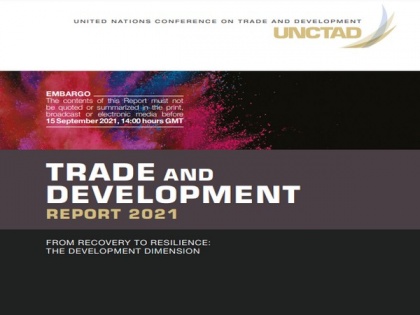UNCTAD issues amber warning on building back better
By ANI | Published: September 16, 2021 12:09 PM2021-09-16T12:09:25+5:302021-09-16T12:20:03+5:30
Shifting decisively away from four decades driven by a misplaced faith in unregulated markets and breathing new life into multilateral cooperation will demand additional policy transformations that go well beyond the rescue packages prompted by the Covid-19 pandemic, according to the UNCTAD Trade and Development Report 2021.

UNCTAD issues amber warning on building back better
Shifting decisively away from four decades driven by a misplaced faith in unregulated markets and breathing new life into multilateral cooperation will demand additional policy transformations that go well beyond the rescue packages prompted by the Covid-19 pandemic, according to the UNCTAD Trade and Development Report 2021.
To their credit, governments in advanced countries have responded to the Covid-19 shock by rediscovering the power of their purse and making resilience, rather than flexibility, the metric of recovery.
But the crisis has also revealed just how fragmented and fragile the global economy has become, and how far this policy shift must extend if the oft-repeated phrase 'built back better is to define the post-pandemic recovery, said the report.
Deprived of the policy independence and vaccines that advanced economies take for granted, many developing countries are facing a cycle of deflation and despair, with a lost decade looming.
Through 2025 developing countries will be 12 trillion dollars poorer because of the pandemic, according to UNCTAD. On some counts, the failure to roll out vaccines will alone knock 1.5 trillion dollars from incomes across the South.
"The global recovery from the pandemic must reach beyond emergency spending and infrastructure investments to embrace a reinvigorated multilateral model for trade and development," said Rebeca Grynspan, Secretary General of UNCTAD.
"Only a concerted rethinking of priorities holds out hope of addressing the inequality and climate crises that have come to define our era."
An examination of policy actions in three key areas of resilience building -- reducing inequality, countering corporate power and reducing carbon emissions -- suggests that advanced economies have taken welcome steps, but without the heft that more decisive steps and coordinated support would bring.
Instead, and even without another financial crash, the global economy will remain subdued for remainder of the decade with developing countries -- particularly in Africa and South Asia -- hit hardest.
( With inputs from ANI )
Disclaimer: This post has been auto-published from an agency feed without any modifications to the text and has not been reviewed by an editor
Open in app